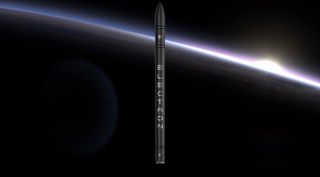Rocket Lab to Launch Spire Satellites

WASHINGTON — Rocket Lab, a New Zealand company developing a small launch vehicle, announced a contract Feb. 14 with Spire to launch a number of that company's small satellites through next year.
Under the contract, Spire will launch some of its satellites on up to 12 launches of Rocket Lab's Electron rocket from New Zealand. Those launches are scheduled to begin in late 2016 and run through 2017.
The announcement did not mention how many satellites will be launched. Chris Wake, head of business operations at Spire, said in a Feb. 15 statement provided by a company spokeswoman that the "precise configuration and quantity of satellites" on those launches had yet to be determined.
San Francisco-based Spire is developing a constellation of more than 100 cubesat-class spacecraft to collect weather data through a technique known as GPS radio occultation, and also provide maritime tracking services. Spire launched its first four satellites last September as secondary payloads on an Indian Polar Satellite Launch Vehicle.
Neither Spire nor Rocket Lab disclosed the value of the contract. Rocket Lab, which started selling payload space on its launches through its website last year, offers a three-unit cubesat on launches in 2017 for $250,000. The company's launches through 2017 are listed as "fully booked" on its site.
Spire is the second company to have announced a multi-launch contract with Rocket Lab. Florida-based Moon Express, a competitor in the Google Lunar X Prize, announced a contract with Rocket Lab in October for up to five launches of its lunar landers. Rocket Lab also won a $6.9 million contract from NASA in October as part of the agency's Venture Class Launch Services program to purchase launches on emerging small launch vehicles.
Rocket Lab is still developing Electron, a vehicle designed to carry up to 150 kilograms into a 500-kilometer sun synchronous orbit. The company said last year it was planning to carry out its first launch by the end of 2015, but Electron has yet to fly. Company spokeswoman Catherine Moreau-Hammond said Feb. 15 that the company plans to start test launches of Electron in the middle of this year.
Get the Space.com Newsletter
Breaking space news, the latest updates on rocket launches, skywatching events and more!
The company is also switching launch sites. In July, the company announced plans to establish a launch site at Kaitorete Spit, a narrow strip of land along the Pacific Ocean on New Zealand's South Island, south of the city of Christchurch. However, in December the company instead broke ground on a site on Mahia Peninsula on New Zealand's North Island.
Moreau-Hammond said the company is working on both sites, although the Mahia Peninsula site will be the first to host Electron launches. "The Mahia site has progressed faster, and offers a wider range of orbital azimuths and facilitates a higher launch cadence than Kaitorete Spit," she said.
Spire is not relying on Rocket Lab alone for launches. Wake said Spire plans to launch more than 20 satellites in the first half of this year on an unspecified set of launches. More launches, he added, are "already slated for the latter half of 2016 and into 2017 on a near monthly basis."
This story was provided by SpaceNews, dedicated to covering all aspects of the space industry.
Join our Space Forums to keep talking space on the latest missions, night sky and more! And if you have a news tip, correction or comment, let us know at: community@space.com.

Jeff Foust is a Senior Staff Writer at SpaceNews, a space industry news magazine and website, where he writes about space policy, commercial spaceflight and other aerospace industry topics. Jeff has a Ph.D. in planetary sciences from the Massachusetts Institute of Technology and earned a bachelor's degree in geophysics and planetary science from the California Institute of Technology. You can see Jeff's latest projects by following him on Twitter.

